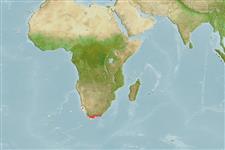Пластиножаберные (акулы и скаты) (sharks and rays) >
Carcharhiniformes (Ground sharks) >
Scyliorhinidae (Cat sharks) > Scyliorhininae
Etymology: Poroderma: poros (Gr.), hole or passage; derma (Gr.), skin or hide, allusion not explained nor evident (Smith proposed name without a description) (See ETYFish); africanum: -anum (L.), belonging to: Africa, described from South Africa (See ETYFish).
More on author: Gmelin.
Environment: milieu / climate zone / depth range / distribution range
экология
морской демерсальный; пределы глубины 0 - 100 m (Ref. 5510). Subtropical; 28°S - 36°S
Southeast Atlantic: endemic to South Africa (Ref. 12484). There are old records from Madagascar and Mauritius, but these require confirmation (Ref. 244).
Length at first maturity / Size / Вес / Возраст
Maturity: Lm 68.5, range 65 - 72 cm
Max length : 101 cm TL самец/пол неопределен; (Ref. 244); 93.0 cm TL (female)
Краткое описание
определительные ключи | морфология | морфометрия
колючие лучи спинного плавника (общее число) : 0; колючие лучи анального плавника: 0. A large catshark with short nasal barbels and long horizontal black stripes (Ref. 5578).
Occurs in the continental shelf, both inshore and offshore (Ref. 5578). Prefers rocky reefs from the intertidal zone down to 100 m depth (Ref. 5578). Nocturnal, often found in caves and crevices during the day (Ref. 5578). Feeds mainly on crustaceans, but also bony fish and cephalopods (Ref. 244). Oviparous (Ref. 50449). Readily kept in captivity (Ref. 244).
Oviparous, with a single egg-case per oviduct (Ref. 244). Embryos feed solely on yolk (Ref. 50449). Size at hatching between 14 and 15 cm.
Compagno, L.J.V., 1984. FAO Species Catalogue. Vol. 4. Sharks of the world. An annotated and illustrated catalogue of shark species known to date. Part 2 - Carcharhiniformes. FAO Fish. Synop. 125(4/2):251-655. Rome: FAO. (Ref. 244)
Статус Красного Списка МСОП (Ref. 130435: Version 2024-2)
Угроза для людей
Harmless
Использование человеком
рыболовство: рыболовство как средство для существования; объект спортивного рыболовства: да
дополнительная информация
инструменты
Специальные отчеты
Скачать в формате XML
ресурсы в Интернет
Estimates based on models
Preferred temperature (Ref.
123201): 16.2 - 22, mean 19 °C (based on 20 cells).
Phylogenetic diversity index (Ref.
82804): PD
50 = 0.7500 [Uniqueness, from 0.5 = low to 2.0 = high].
Bayesian length-weight: a=0.00282 (0.00157 - 0.00507), b=3.22 (3.05 - 3.39), in cm total length, based on LWR estimates for this species & (Sub)family-body (Ref.
93245).
Trophic level (Ref.
69278): 3.6 ±0.5 se; based on diet studies.
устойчивость к внешним воздействиям (Ref.
120179): низкий, минимальное время удвоения популяции 4.5-14 лет (Fec assumed to be <100).
Fishing Vulnerability (Ref.
59153): High vulnerability (61 of 100).
Nutrients (Ref.
124155): Calcium = 20.9 [3.6, 115.7] mg/100g; Iron = 0.674 [0.178, 1.992] mg/100g; Protein = 18.3 [15.2, 21.4] %; Omega3 = 0.166 [0.072, 0.366] g/100g; Selenium = 22.6 [6.9, 64.6] μg/100g; VitaminA = 8.49 [2.90, 24.19] μg/100g; Zinc = 0.614 [0.294, 1.120] mg/100g (wet weight);
